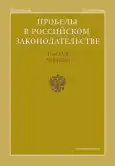Право как отсылка и отсылка на «право»
- Авторы: Гришин К.С.1
-
Учреждения:
- Московский государственный университет имени М.В. Ломоносова
- Выпуск: Том 17, № 3 (2024)
- Страницы: 223-237
- Раздел: Разное
- URL: https://journals.eco-vector.com/2072-3164/article/view/634238
- EDN: https://elibrary.ru/KLIYFS
- ID: 634238
Цитировать
Аннотация
В статье рассматривается, как право и отсылка на право в силу своей природы могут быть инструментами манипуляции. Читателям предлагается концепция восприятия положений права как отсылки, прима передачи информации, при котором смысл исходного сообщения возможно понять только при обращении к иным сообщениям. Приводятся примеры использования отсылок на квази-правовые положения и положения закона с целью введения в заблуждение. Отмечается, что существуют различные виды вводящих в заблуждение отсылок: заблуждающая отсылка на «право», заблуждающая отсылка на декларативную норму закона, заблуждающая отсылка на норму закона с контринутитивным исполнением и заблуждающая отсылка на нормативную систему. Практическое значение исследования состоит в описании механизмов различных типов заблуждающих отсылок (явление, которое я предлагаю рассмотреть как самостоятельный объект изучения юридической науки), наличие которых дискредитирует любую правовую систему, т. е. является прямой угрозой правовой стабильности. Надеюсь, что разработанная мной в той степени, в какой позволяет формат статьи, методология позволит сделать конкретные заблуждающие отсылки предметом исследования правоведов-отраслевиков и стимулирует разработку таких методов правотворчества и ревизии законодательства, которые снизят вероятность использования текстов нормативных актов с целью ввода в заблуждение.
Полный текст
Об авторах
Кирилл Сергеевич Гришин
Московский государственный университет имени М.В. Ломоносова
Автор, ответственный за переписку.
Email: 7tgks7@gmail.com
SPIN-код: 7140-9150
аспирант кафедры Теории государства и права и политологии юридического факультета
Россия, МоскваСписок литературы
- Ахмадулин И.Р. Итальянские забастовки в России // Социологические исследования, 2020. №10. С. 95-105.
- Большак А.В., Макоедова Н.В. К вопросу о роли культурной отсылки в переводе // Иностранные языки в контексте межкультурной коммуникации. 2021. №XIII. URL: https://cyberleninka.ru/article/n/k-voprosu-o-roli-kulturnoy-otsylki-v-perevode (дата обращения: 15.05.2024).
- Бондюрант Э. The Senate Filibuster: The Politics of Destruction // Bondurant, Mixson & Elmore, LLP, 2010.
- Гадамер Х-Г. Истина и метод: Основы филос. герменевтики. М.: Прогресс, 1988. 704 с.
- Гурвич Г. Д. Философия и социология права: Избранные сочинения. СПб.: Издательский Дом С.-Петерб. гос. ун-та, Издательство юридического факультета С.-Петерб. гос. ун-та, 2004. 848 с
- Деррида Ж. Деконструкция: тексты и интерпретация. Минск: Экономпресс, 2021. 320 с.
- Кельзен Г. Право, государство и справедливость в чистом учении о праве // Правоведение, № 2 (307), 2013. С. 226-240.
- Кросс Р. Прецедент в английском праве. М. : Юрид. лит., 1985. 238 с.
- Крушанов А. А. Понятие «управление» в кибернетическом контексте // Vox. Философский журнал. 2017. №23. URL: https://cyberleninka.ru/article/n/ponyatie-upravlenie-v-kiberneticheskom-kontekste (дата обращения: 14.05.2024).
- МакКлауд Я. Legal Theory. London: Bloomsbury Publishing, 2012. 264 p.
- Ман М. Темная сторона демократии. СПб.: ООО Издательство «Питер», 2023. 896 с.
- Новикова Э. Ю. Дискурсивно обусловленный культурный трансфер в переводе путеводителя // Вестник ВолГУ. Серия 2: Языкозна-ние. 2014. №3. URL: https://cyberleninka.ru/article/n/diskursivno-obuslovlennyy-kulturnyy-transfer-v-perevode-putevoditelya (дата обращения: 15.05.2024).
- Петражицкий Л.И. О мотивах человеческих поступков, в особенности об этических мотивах и их разновидностях. СПб: Тип. Э.Л. Пороховщиковой, 1904. 75 с.
- Радбрух Г. Философия права. М.: Международные отношения, 2004. 240 с.
- Рейснер М.А. Теория Л. И. Петражицкого, марксизм и социальная идеология. СПб: Тип. Т-ва «Обществ. Польза», 1908. 239 с.
- Сёмик А.А. Нереализуемость уголовно-исполнительных норм как особенность развития системы мест лишения свободы в истории России XVIII-ХХ вв // Теория и практика общественного развития. 2016. №7. URL: https://cyberleninka.ru/article/n/nerealizuemost-ugolovno-ispolnitelnyh-norm-kak-osobennost-razvitiya-sistemy-mest-lisheniya-svobody-v-istorii-rossii-xviii-hh-vv (дата обращения: 24.03.2024).
- Скьявоне А. K-9 Catch-22: The Impossible Dilemma of Using Po-lice Dogs in Apprehension of Suspects // University of Pittsburgh Law Review, Vol. 80, No. 3, 2018.
- Ферри Э. Уголовная социология. М.: Инфра-М, 2005. 658 c.
- Финнис Д. Естественное право и естественные права. М.: ИРСЭН, социум, 2019. 554 с.
- Фролова Е.А. Методология и философия права: от Декарта до русских неокантианцев : монография. М.: Проспект, 2017. 304 с.
- Шипан Ч. A War of Words: Explaining the Duration of the Fili-buster in the U.S. Senate, 1919-1993 // University of Michigan at Ann Arbor - Department of Political Science, 2006.
- Шнеер А. Плен: солдаты и офицеры красной армии в немецком плену. М: Пятый рим, 2022. 608 с.
Дополнительные файлы









